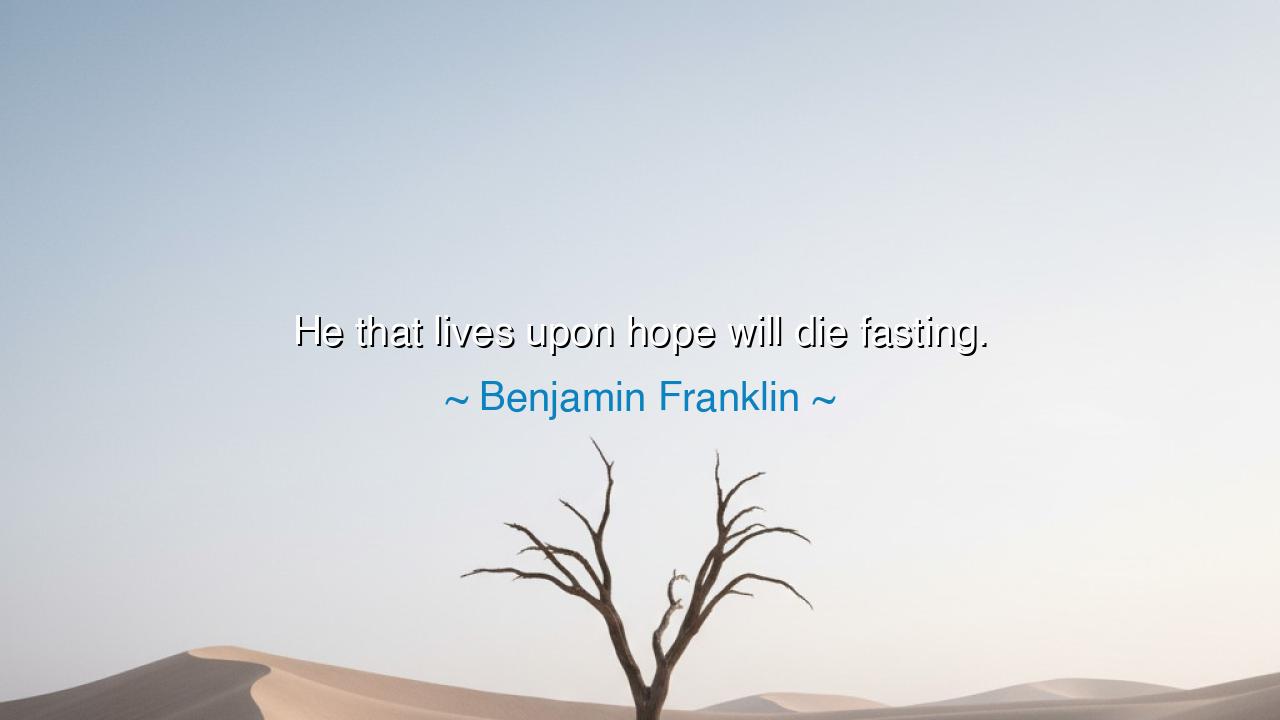
He that lives upon hope will die fasting.






The words of Benjamin Franklin—“He that lives upon hope will die fasting”—cut through the air like a blade of reason sharpened by experience. They come not from cynicism, but from the deep well of a man who understood the balance between dream and discipline, between the comfort of hope and the necessity of action. Franklin, one of the architects of a new nation and a philosopher of practical wisdom, warned his listeners that hope without labor is a hollow meal—sweet to imagine, but nourishing to none. To live “upon hope” is to feast upon the air; it fills the mind for a moment but leaves the spirit empty.
Franklin was a man of immense hope himself—he dreamed of freedom, progress, and the perfectibility of humankind—but he also knew that hope must serve work, not replace it. His life was built upon the union of imagination and effort. When he penned this line, he spoke to all who would sit idle, waiting for fortune to favor them. Hope, he tells us, is not meant to be the meal itself but the spark that lights the fire to cook it. It is the seed of ambition, not its fruit. Those who merely hope without acting, who pray for success without labor, will, as he says, “die fasting”—starved of achievement, of fulfillment, of meaning.
The wisdom of this truth echoes across time. In the ancient world, the philosopher Seneca said, “Luck is what happens when preparation meets opportunity.” He, like Franklin, saw that hope alone cannot alter the course of destiny. The Romans honored diligence as a divine force, and the Greeks told myths warning of those who waited passively for fate’s favor. Even Prometheus, who gave fire to man, acted out of defiance and will, not waiting for the gods to grant him what humanity lacked. Franklin’s proverb, spoken in the plain tongue of the common man, carries that same heroic spirit: act, or perish of hunger for what could have been.
Consider the story of Abraham Lincoln, born in a log cabin with nothing but hope for education and progress. He might have died poor, his dreams unfulfilled, had he merely wished for greatness. But he studied by candlelight, he toiled through failure after failure, and his relentless action transformed hope into history. It was not hope that wrote the Gettysburg Address or freed the enslaved; it was the will that rose each day to act upon that hope. The faster Franklin warns of is the man who prays for change but never lifts his hands to shape it. Lincoln feasted, because his hope was not idle—it was working hope, hope translated into effort.
Franklin’s teaching is not to despise hope, but to discipline it. Hope is holy when it guides us toward creation, but poisonous when it becomes an excuse for delay. The idle man says, “I will succeed when the time is right,” but the wise man acts and makes the time right. The woman who waits for inspiration may wait forever, but the one who works daily will find that inspiration walks beside her. The harvest belongs not to the hopeful, but to the diligent. Even the sacred texts of old proclaim, “Faith without works is dead.” Hope without action is the same—it is belief without breath, a promise that never takes form.
Franklin’s own life was proof of his creed. As a boy, he worked in his brother’s printing shop, studying by dawn and experimenting by dusk. He could have “hoped” to one day become learned, but instead, he labored toward wisdom. When he founded libraries, civic institutions, and inventions that bettered the lives of countless others, it was not the result of wishful dreaming, but of ceaseless doing. His hope for humanity was vast, but his hands were never still. In every word, every invention, every public act, Franklin showed that the truest hope is made visible through effort.
Let this, then, be the teaching for those who walk the path of purpose: hope, but act. Dream, but do. Do not feast upon visions alone; feed yourself upon work, and let each day’s effort be your bread. Hope is the lamp that shows the way forward, but your feet must walk the path. When doubt whispers, “Wait,” let Franklin’s words answer: “Work.” For the world rewards not those who live upon hope, but those who make hope live through their deeds.
And so, remember, O traveler of time and toil: hope is sacred only when it breathes through action. Dream your dreams, but wake to labor for them. Plant your seeds, but tend them with sweat. For those who wait for fate will hunger forever, but those who rise to meet it will feast upon the fruits of their own creation.






AAdministratorAdministrator
Welcome, honored guests. Please leave a comment, we will respond soon